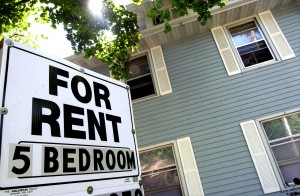 While every property renter should be aware of the possibility of scams when it comes time to sign the lease, college students should be particularly careful when signing a student housing lease. It is often the case that students are new to living on their own: searching for a decent, well-priced apartment is hard enough on its own, but students often don’t anticipate how difficult signing the lease can be. Pages of dense writing, legalese, and sometimes confusing clauses, all with the manager standing at your side, keys in hand, can be too much to take in immediately.
While every property renter should be aware of the possibility of scams when it comes time to sign the lease, college students should be particularly careful when signing a student housing lease. It is often the case that students are new to living on their own: searching for a decent, well-priced apartment is hard enough on its own, but students often don’t anticipate how difficult signing the lease can be. Pages of dense writing, legalese, and sometimes confusing clauses, all with the manager standing at your side, keys in hand, can be too much to take in immediately.
Signing the Lease
College students should resist the urge to smile and sign, although it may seem like a good idea at the time. You may feel as though you are offending your landlord by taking a step back and reading the entire lease in detail. You may even feel as though your landlord can be trusted 100%.
But the thing is, signing a legally binding document is serious, and can have significant repercussions on your life and finances. While lease terms vary depending on where you are living, many of them can be binding for up to a year. That means that, legally speaking, you are beholden to any clause within the contract as long as it is legal. With that in mind, take your time reviewing your lease. It is often the case that mistakes, if you do not catch them, will be to your disadvantage. Even if your landlord has made an error or is otherwise in the wrong, the amount of time, energy, and money you might end up spending securing your rights is not worth this ounce of prevention.
Different Types of Leases
As there is no such thing as a template for a lease, or a standard lease, landlords have a lot of leeway in the ones that write. Many lease forms can have huge legal or ethical problems. But it is not uncommon for future tenants, including college students, to be unaware of them before it is too late.
The risk that you would be running by signing your lease without question is possible to circumvent, but the responsibility is on your shoulders as the tenant. Read your lease carefully – do not skim it – before signing it. It is acceptable to ask for a copy to review overnight, although be aware that for some landlords, signs of hesitance in a tight market may make them just dump you in favor of another candidate.
Watch Out for Red Flags
While you can never know before you read the lease, there are some signs that may indicate that your landlord may be untrustworthy. If he or she does not give you a copy of the lease, however, that is your first red flag. Another is them trying to rush you to sign it, right there on the spot. Do not let them push you into doing anything you are unsure of. If the landlord tries to minimize a clause that you ask about by saying that they do not enforce it, or it is just a formality, be firm: ask the landlord to remove the clause if it is so unimportant or unenforced. You are allowed, to some extent, to negotiate the contents of your contract. Even if the landlord will not negotiate with you, it does not hurt to ask.
Another red flag is the landlord’s insistent on an oral agreement that they will not add to the contract. Unfortunately, you cannot take a handshake or someone’s word to a court of law.
One of the most important things a tenant can remember is that “standard contracts” do not exist. If your potential landlord tries to brush of your concerns with this platitude, they may be trying to pull one over on you.
_____________________
Author Bio
Joshua Turner is a writer who creates informative articles in relation to business. In this article, he offers tips to students faced with signing a house lease and aims to encourage further study with a Real Estate College Degree.
